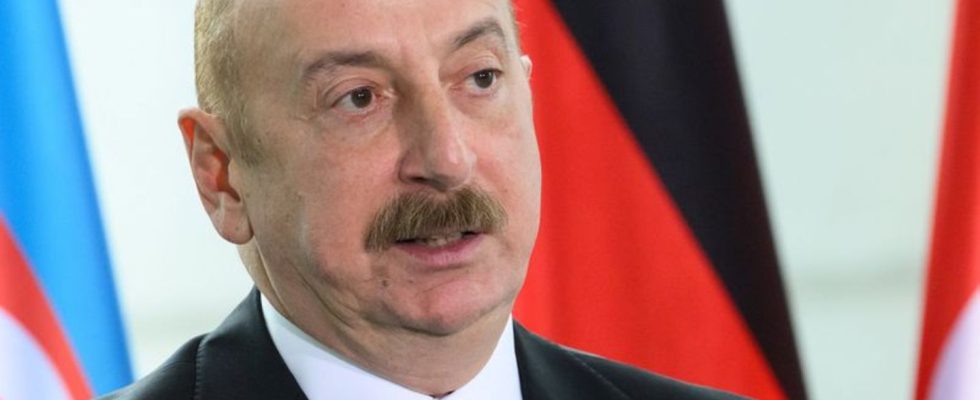Azerbaijan
Expert: Aliyev wants to secure power with early elections
Wants to stay in power: Ilham Aliyev. photo
© Bernd von Jutrczenka/dpa
Last fall, Azerbaijan conquered the disputed Nagorno-Karabakh region. The authoritarian President Aliyev now wants to use the triumph and consolidate his power in an early election.
The early presidential election in an authoritarian country According to South Caucasus expert Marcel Röthig, Azerbaijan on Wednesday will primarily serve to secure power for incumbent Ilham Aliyev.
Aliyev’s official justification for bringing forward the vote, which was actually planned for 2025, is that after the conquest of the Nagorno-Karabakh conflict region, Azerbaijan’s territorial integrity has now been restored and therefore new legitimacy is needed for the president, Röthig told the German Press Agency . He heads the South Caucasus office of the SPD-affiliated Friedrich Ebert Foundation. “But I believe that the causes lie deeper,” said Röthig, whose regional office is based in the Georgian capital Tbilisi.
Possible reasons for early voting
“It is not said that this family rule is set in stone forever,” said Röthig, referring to the 62-year-old Aliyev, who took over the presidency from his father Heydar Aliyev in 2003 and has been re-elected several times since then. “Beyond the glittering facades of Baku, there are also signs of a certain fragility. I think people are choosing to vote in the face of this long-term uncertainty and creating a new legitimacy, knowing that the economic and social situation may become more uncertain in a year or two and is more difficult.” In this way, Aliyev avoids “having to hold elections in a situation where breaking points become even more visible than they are at the moment,” said Röthig.
After coming to power in Nagorno-Karabakh, the president demonstratively presented himself as the winner. There had been decades of fighting between Azerbaijanis and Armenians over the region. After a war in 2020, the Azerbaijani army last fall also conquered the rest of the region, which is within Azerbaijani territory but was predominantly inhabited by ethnic Armenians. The leadership of the self-proclaimed Republic of Artsakh (Nagorno-Karabakh) surrendered and the majority of the more than 100,000 Karabakh residents fled. Armenia, which, like its neighboring country Azerbaijan, was once part of the Soviet Union, spoke of “ethnic cleansing”.
Challenges for Azerbaijan
From an Azerbaijani perspective, the situation around Karabakh is now largely “resolved,” explained Röthig. At the same time, he emphasized: “If this external enemy image of Armenia disappears, then there is a risk that people will start thinking about other political challenges.” Compared to other South Caucasus states, Azerbaijan, which is located on the Caspian Sea and is heavily dependent on oil and gas exports, has great social inequality, high inflation and lower economic growth.
According to observers, the vote on February 7, to which more than six million Azerbaijanis are called, is by no means a fair and free election. International election observers point out that there is not a single truly opposition candidate. All six candidates on the ballot alongside Aliyev have publicly supported the president in the past, according to a report by the OSCE Office for Democratic Institutions and Human Rights (ODIHR) in Europe. In addition, numerous critical journalists have been arrested in recent months.

